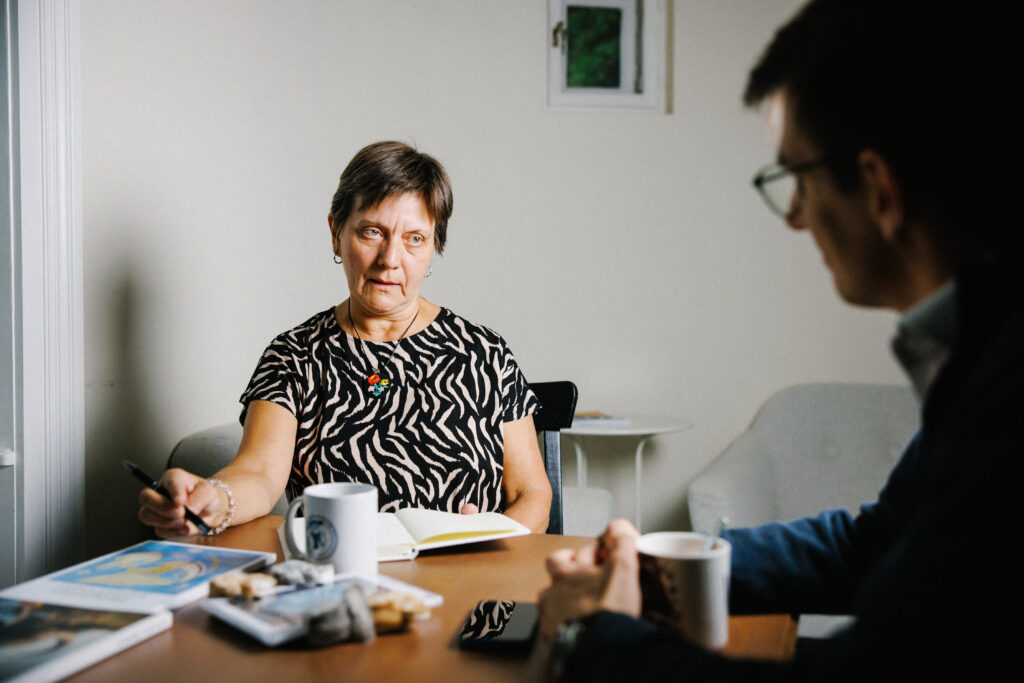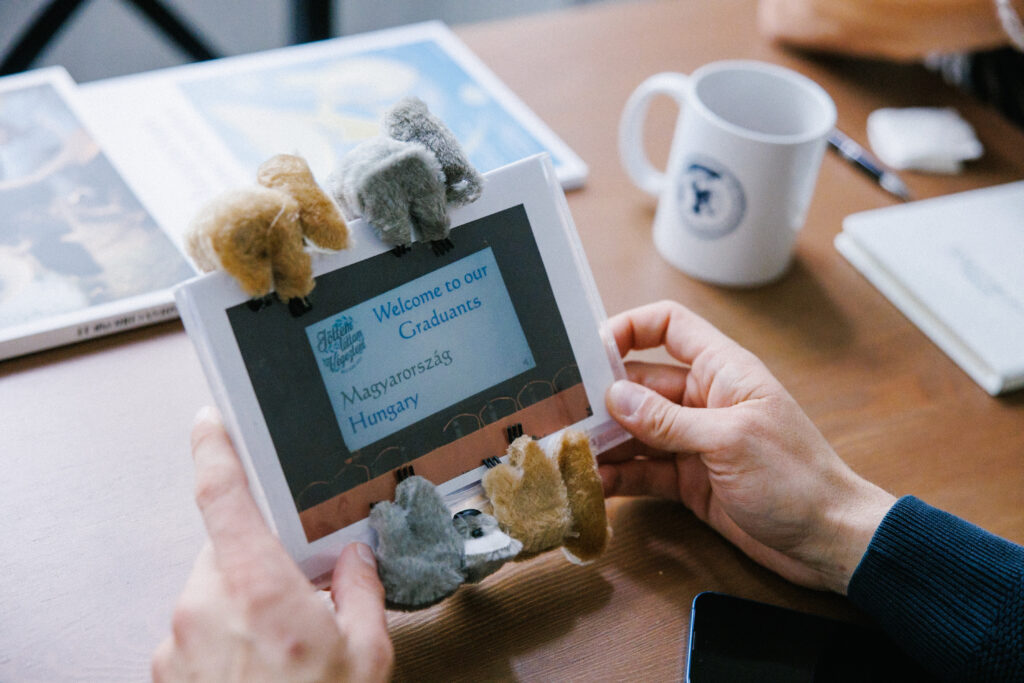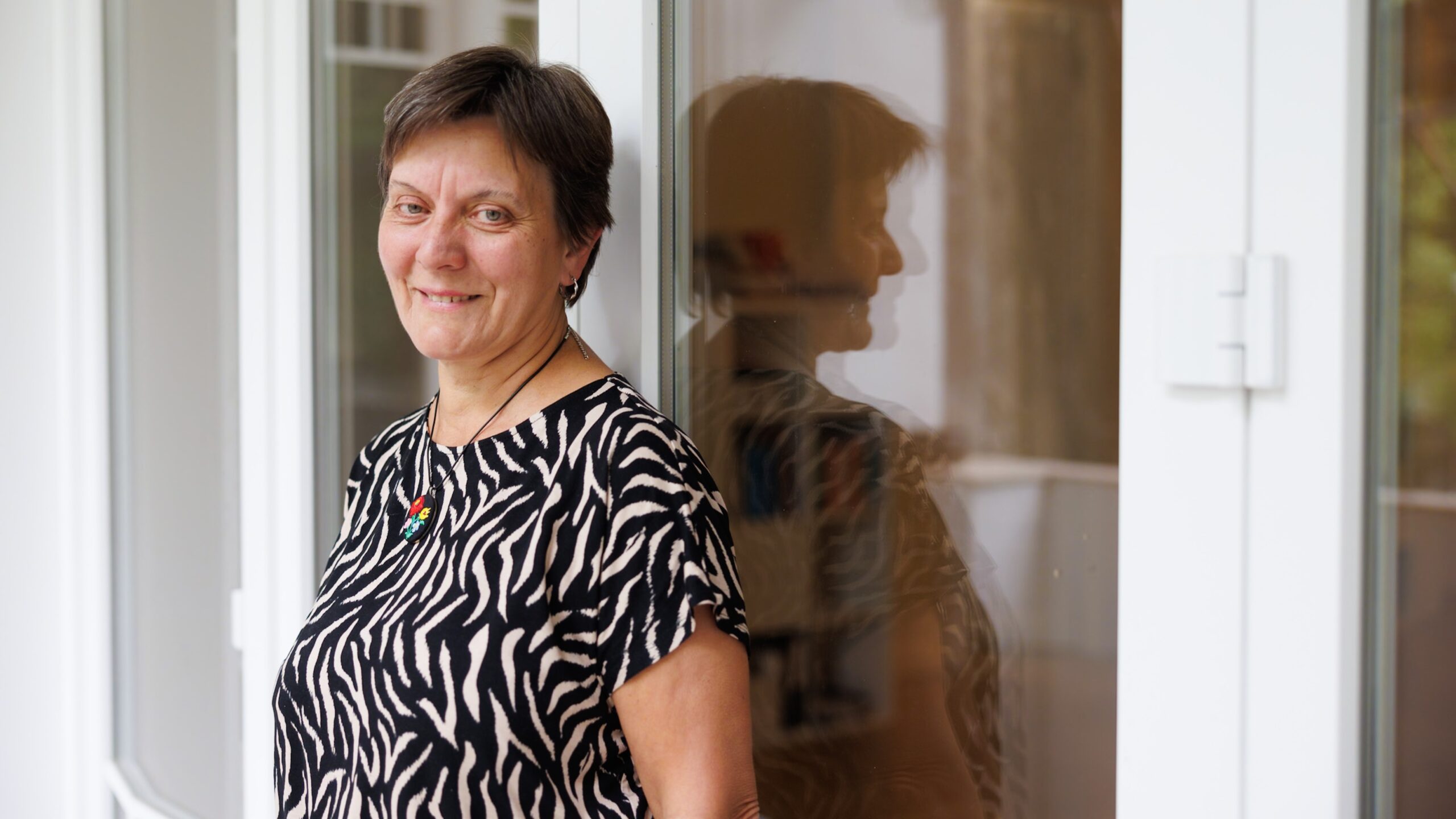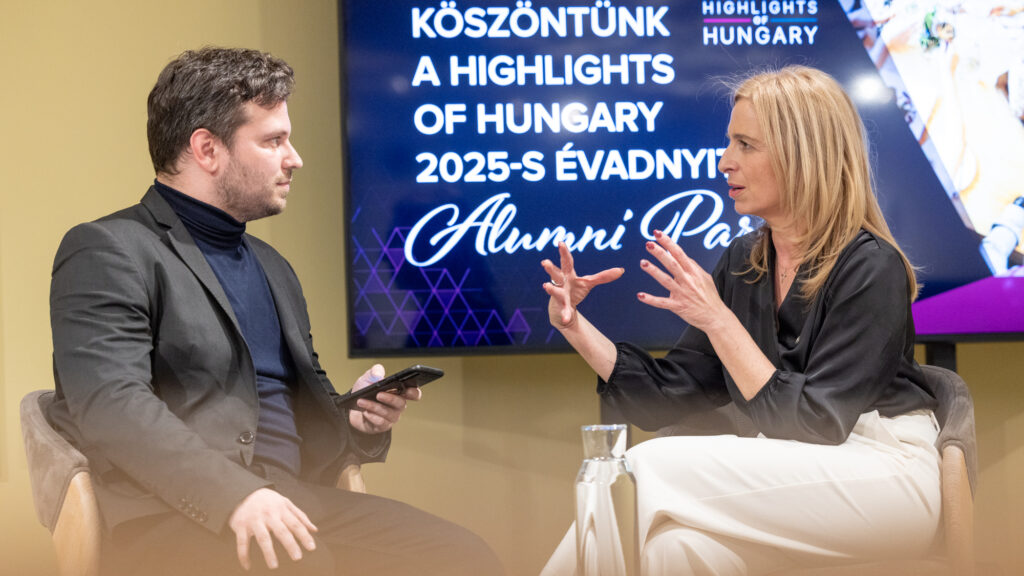Ágnes Szabó is a Hungarian Australian language teacher who serves the the Principal of the Hungarian Community School in Adelaide. In 2014 she was awarded the Best Community Language Teacher in South Australia prize, and on 20 August 2021 she was bestowed upon the Hungarian Gold Cross of Merit by the Hungarian Government. We had the opportunity to interview her in Budapest.
***
How did you arrive in Australia?
I came to Australia by plane, but certainly, the same cannot be said about those before me. Anyone who’s spent a longer time on a plane can at least imagine what a two-day trip from Budapest to Adelaide must be like. Well, my ancestors spent three weeks on a boat before arriving on the shores of Australia. I myself live in Adelaide, having arrived here on 25 March 1990, in right of family reunion. Many people come to Australia to earn a good living, but by nature, I have never been driven by money, but by the spirit.
I suppose that is where your special connection with the Hungarian language and the Hungarian national identity comes from…
Yes, but in the first years, I was not really interested in Hungarianness. The change came when my mother came to visit me in Australia for two years. She was the one who asked to listen to some Hungarian language radio network because she was very tired of English, which she didn’t understand. I tuned in to a Hungarian broadcaster that was playing gypsy music. And then it became clear to me: no matter if it is gypsy music or any other music with Hungarian roots, I’m guaranteed to cry.
What exactly did you feel?
A huge sense of homesickness. That I wanted to come home. Of course, I couldn’t do that anymore because the family laws are strong in Australia too. I was aware that this framework was like a glue that stuck. But it also has the potential to make me think: why am I in Australia? What am I doing here?
And what are you?
At that time, I had only got to the point where I knew I had to help the Hungarian people in some way. Therefore, I surrounded myself with a lot of old people, because I thought that on the one hand, they were a kind of protection for me, but on the other hand, people in Australia are also getting older, so they need help over time, too. You have to take them to the dentist or go and help them understand what the very fast-talking English-speaking banker in the bank is saying. I became a very serious ‘help maniac’.
Hungarian Conservative’s Diaspora project aims to help Hungarians living outside the motherland become informed about and to keep their Hungarian identity alive—the project, thus, is conservative in this sense. But the long-term goal is to form an information bridge between the Hungarians of the world, in a non-partisan way. May I ask what your attitude towards politics is?
Actually, I did not move to Australia with an interest in politics, and I was not interested in it in Australia either, but I was confronted with intense, skin-to-skin politics there, through human stories. People often told me stories: at a huge lunch for Hungarians, one of them on one side of the table, his former opponent on the opposite side, and then they had to smile at each other. Stories and occasions like these made me realize important things. It didn’t matter where in the Carpathian Basin you were from, Budapest, Dunaszerdahely (today’s Dunajská Streda, Slovakia), Székelyudvarhely (today’s Odorheiu Secuiesc, Romania), or the Danube Bend; it didn’t matter whether you were an intellectual or a labourer—we all went to the same place because somehow, everyone was looking for the Hungarian voice, literally.

These occasions are a very interesting reflection of Hungarian society then, and now. It’s a snapshot of how people have socialized over the decades, and how they have dealt with the information they have received from socializing in these small communities. We are actually role-playing. We had to overcome different world and political views, cultural views, and values, and put them together into something new.
For the past year, I have been on a journey to get to know the world’s Hungarians better. Based on my experience so far, my conclusion is that living in the diaspora, Hungarians are first and foremost Hungarians, and it becomes relevant only after that whether one is a supporter of the Labour Party or the Liberals, the Republicans or the Democrats, etc. Living in the diaspora, that certain national minimum we seek at home seems to become obvious. Being Hungarian is what the national minimum is overseas. Is that a correct conclusion?
I would like to give you a symbolic example: I may say I don’t like you, I may avoid you, but if I see you being hit by a car in the street, I’m the first one to go and help you. I am convinced that this is because being Hungarian is a spiritual quality. If someone is Hungarian, he is Hungarian first and foremost, and he starts to argue only after that—of course, in Hungarian. If we do not have a common value or a common means of communication, what are we talking about at all? Then we could go to any other community and continue all that in English. Coming back to spiritual quality: there are also people, especially those of the second, third, and fourth generation, who don’t even speak Hungarian yet, but something awakens in them that says they have to visit Hungary. I have met a number of these individuals because, for a long time, I was translating and filling in their documents for their citizenship applications. Many of them initially would have used their passports to work in the European Union for some time. They said to me many times, ‘Oh my God, is this Hungary, is this where my parents come from? I want to go back there!’
‘Being Hungarian is a spiritual quality. If someone is Hungarian, he is Hungarian first and foremost’
And are they coming back?
A lot of people are coming back. Not necessarily to Hungary, but to Europe, and they come over to Hungary to study, work, live, or do whatever. But I will tell you something very interesting: I have a student who is not Hungarian, who has nothing to do with being Hungarian. She’s my daughter’s friend and we took her to a Hungarian community once where there was an old lady who was 88 years old at the time. She was very nice, they were talking nicely, but the lady hardly knew any English and the girl didn’t know any Hungarian, so they were communicating mostly by gesturing. The girl then started to learn Hungarian at my place so that she could speak Hungarian with the old lady! As a result, she is now in the Balassi Programme, without any Hungarian background, doing the one-year course. I think her soul must be Hungarian.
You have mentioned that there are several generations of Hungarians living in Australia, and it is the youngest generation that you meet the most at the Hungarian Community School in Adelaide. Can you tell us a little bit about the school and what challenges you face when you work with the children?
First, let me talk about the results. From 2007 to 2012, I was the leader of a working group preparing for the Hungarian graduation exam in Australia. As I know both languages, I was assigned as a translator and interpreter there. What I realized during the five years spent there was that schools in Australia don’t even know about each other. So, the impressions you have had here in Australia are essentially since the year 2013. In 2010 nobody knew about anybody yet. When I went to another city, I was immediately asked in bewilderment what I was doing there, when they have a different exam there than in Adelaide. And I just couldn’t explain to them that they were writing the same exam in every state in Australia. I was faced with a choice: either continue my existing work and the Hungarian graduation exam in Australia would die out or get out of the official job and become a teacher or organizer to settle what I saw from the inside was working terribly. I chose the latter and went to the Hungarian Community School in Adelaide as a volunteer teacher, where we slowly built up a system that not only accepted students from Adelaide but also taught high school students online nationwide.

Can you give some context to these results?
As far as I know, Australia is the only country in the world where, nationally, children have been able to graduate from high school with a Hungarian language qualification that does count in their university entrance score, for 35–40 years now. Nowhere else in the world is there a system like this one. Note, however, that it wasn’t me who started it, I just tried to maintain the system with my colleagues. In the beginning, of course, not all states had it, but we have now achieved a situation where seven of the eight states have a uniform Hungarian graduation exam, and I will not retire or die until the whole country has it. Thank God, it’s a quite slow process, so I’ll be alive for a while…
And what do you teach? The classic graduation subjects?
That’s a very good question, everyone asks it. We teach language. But, of course, you have to learn the language through something. So, I can teach it through how to cook Macaroni Milanese, which is not a Hungarian product, or through how to cook goulash. Obviously, I’m going to choose the goulash. So, the aim is to teach the students one lesson a week to be able to achieve 86 per cent in the graduation exam, even at the upper or intermediate level.
It doesn’t sound like an easy task…
It’s not! In this one hour, everything—culture, history, literature, folk dance, folk motifs—must fit in, so that the students not only feel that we are pushing the information into their heads but that they can give out theirs, too, so that they can process all of it and acquire a local Hungarian consciousness and Hungarian language.
What concrete examples could you mention?
For example, there is the Hungarian word ‘kaja’, which is an informal way to say ‘food’. A lot of people say that it’s not a very nice word, whereas in Australia it’s a perfectly acceptable term. Because if mummy and daddy speak like that at home, what could a child learn at home other than ‘kaja’? The Hungarian world in Hungary has to acknowledge that in some diasporas, and even in some places within the country, a language may develop in a way that may be outside the so-called classical ‘framework’, but you only have to look at the globe to see that we do live outside this framework as it is. Nevertheless, we are of course trying to teach the formal Hungarian language itself.
Let’s look at a classic example. How do you teach history, for instance?
Using a project-based approach. We have 8–10 students in the online group, each one chooses an event from history based on what they hear at home from their parents; what they are criticizing or praising or talking about at all. The child brings it to class, and they have to look together at what’s on the internet about that event, what’s in the books, etc., and then everyone reports back in class on their own research.
‘As far as I know, Australia is the only country in the world where, nationally, children have been able to graduate from high school with a Hungarian language qualification’
What are the biggest challenges with this method?
The biggest challenge is how to reach new students because there is no marketing opportunity at all. Absolutely none. In contrast, I don’t think there is another Hungarian school in the world that has been able to retain so many high school students. We have 85 students; we’ve had a stable number of high school students between 65 and 85 for years. This is a huge number, even taking into account that this is not the number of graduates each year, but the number of students in the whole system, from seventh to twelfth grade. Back to the challenges, it is very difficult to retain high school students—you have to give them a huge amount of motivation, but fortunately, here they are still studying with us.
Would marketing make it easier?
If we can do this without marketing, imagine if we had marketing as a downwind. With marketing, maybe the parents of the children would notice each other and talk to each other, too. There have been times when it turned out that two families knew each other, and they didn’t talk about the fact that both of their children were coming to study with us.
Let me ask you a question about the issue of identity. My sister moved to Melbourne last November and is settling there. We were chatting in the car about how she would preserve her Hungarian identity if she had a child. Her partner is Australian. In the course of the conversation, it emerged that they were concerned that the Australian majority society might find it more difficult to accept individuals who want to integrate into the majority society with a strong sense of identity. Is this actually the case?
I think it depends on the individual and how they perceive it. I could perceive this interview as a kind of forced conversation, but I could also perceive it as a challenge to take everyone’s interests into account and to develop a common platform. Can I give you a personal example?
Please do.
My child, at the age of seven, told me in English to go back to where I came from, where they would speak to me in Hungarian, and to leave her alone. Wow, that’s great, I thought to myself. I started packing my suitcase and she asked me in English, ‘Where are you going now?’. I said that I was going to where she sent me. I spoke in Hungarian, she spoke in English. Unfortunately, we had to come back to Hungary a year after that because my mother became seriously ill. We moved back for half a year and put the child in kindergarten so that she wouldn’t have to come to the hospital with me from the first day on. She was admitted. When I went to pick her up one evening, one of the mothers started yelling at me. I asked her what was wrong with her. She told me not to lie because this child was born here, she speaks Hungarian perfectly, without even an accent. I hugged and kissed the mother and told her she couldn’t have given me greater joy. She still didn’t understand what this great friendship was all about, but then I managed to explain it to her. Before that, I had hardly heard my child speak any Hungarian, but then she proved in the Hungarian kindergarten that a child’s mind is really like a sponge! And that must be taken advantage of.
Read more Diaspora interviews:








